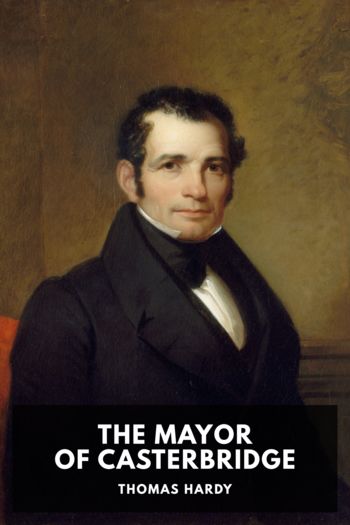Jude the Obscure by Thomas Hardy (snow like ashes .txt) 📕

- Author: Thomas Hardy
Book online «Jude the Obscure by Thomas Hardy (snow like ashes .txt) 📕». Author Thomas Hardy
“And you came to hunt me up, and deliver me, like a good angel!”
“I thought I would come by the morning train and try to find you—in case—in case—”
“I did think of my promise to you, dear, continually! I shall never break out again as I did, I am sure. I may have been doing nothing better, but I was not doing that—I loathe the thought of it.”
“I am glad your staying had nothing to do with that. But,” she said, the faintest pout entering into her tone, “you didn’t come back last night and meet me, as you engaged to!”
“I didn’t—I am sorry to say. I had an appointment at nine o’clock—too late for me to catch the train that would have met yours, or to get home at all.”
Looking at his loved one as she appeared to him now, in his tender thought the sweetest and most disinterested comrade that he had ever had, living largely in vivid imaginings, so ethereal a creature that her spirit could be seen trembling through her limbs, he felt heartily ashamed of his earthliness in spending the hours he had spent in Arabella’s company. There was something rude and immoral in thrusting these recent facts of his life upon the mind of one who, to him, was so uncarnate as to seem at times impossible as a human wife to any average man. And yet she was Phillotson’s. How she had become such, how she lived as such, passed his comprehension as he regarded her today.
“You’ll go back with me?” he said. “There’s a train just now. I wonder how my aunt is by this time. … And so, Sue, you really came on my account all this way! At what an early time you must have started, poor thing!”
“Yes. Sitting up watching alone made me all nerves for you, and instead of going to bed when it got light I started. And now you won’t frighten me like this again about your morals for nothing?”
He was not so sure that she had been frightened about his morals for nothing. He released her hand till they had entered the train—it seemed the same carriage he had lately got out of with another—where they sat down side by side, Sue between him and the window. He regarded the delicate lines of her profile, and the small, tight, apple-like convexities of her bodice, so different from Arabella’s amplitudes. Though she knew he was looking at her she did not turn to him, but kept her eyes forward, as if afraid that by meeting his own some troublous discussion would be initiated.
“Sue—you are married now, you know, like me; and yet we have been in such a hurry that we have not said a word about it!”
“There’s no necessity,” she quickly returned.
“O well—perhaps not. … But I wish—”
“Jude—don’t talk about me—I wish you wouldn’t!” she entreated. “It distresses me, rather. Forgive my saying it! … Where did you stay last night?”
She had asked the question in perfect innocence, to change the topic. He knew that, and said merely, “At an inn,” though it would have been a relief to tell her of his meeting with an unexpected one. But the latter’s final announcement of her marriage in Australia bewildered him lest what he might say should do his ignorant wife an injury.
Their talk proceeded but awkwardly till they reached Alfredston. That Sue was not as she had been, but was labelled “Phillotson,” paralyzed Jude whenever he wanted to commune with her as an individual. Yet she seemed unaltered—he could not say why. There remained the five-mile extra journey into the country, which it was just as easy to walk as to drive, the greater part of it being uphill. Jude had never before in his life gone that road with Sue, though he had with another. It was now as if he carried a bright light which temporarily banished the shady associations of the earlier time.
Sue talked; but Jude noticed that she still kept the conversation from herself. At length he inquired if her husband were well.
“O yes,” she said. “He is obliged to be in the school all the day, or he would have come with me. He is so good and kind that to accompany me he would have dismissed the school for once, even against his principles—for he is strongly opposed to giving casual holidays—only I wouldn’t let him. I felt it would be better to come alone. Aunt Drusilla, I knew, was so very eccentric; and his being almost a stranger to her now would have made it irksome to both. Since it turns out that she is hardly conscious I am glad I did not ask him.”
Jude had walked moodily while this praise of Phillotson was being expressed. “Mr. Phillotson obliges you in everything, as he ought,” he said.
“Of course.”
“You ought to be a happy wife.”
“And of course I am.”
“Bride, I might almost have said, as yet. It is not so many weeks since I gave you to him, and—”
“Yes, I know! I know!” There was something in her face which belied her late assuring words, so strictly proper and so lifelessly spoken that they might have been taken from a list of model speeches in The Wife’s Guide to Conduct. Jude knew the quality of every vibration in Sue’s voice, could read every symptom of her mental condition; and he was convinced that she was unhappy, although she had not been a month married. But her rushing away thus from home, to see the last of a relative whom she had hardly known in her





Comments (0)